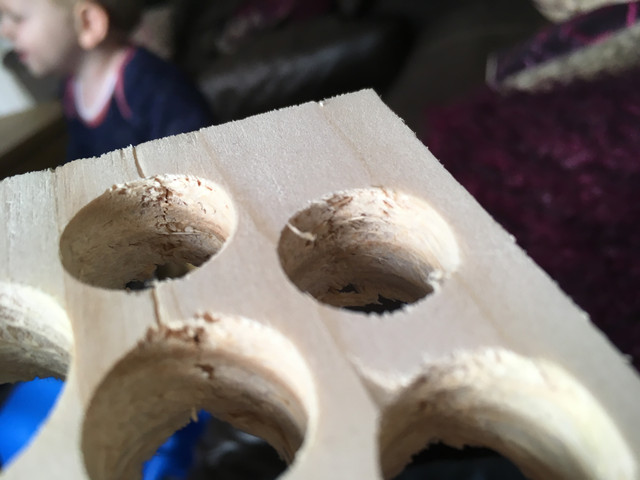BluegillUK
Established Member
Hi all,
Hope you're having a nice weekend so far!
Got a bit of a quandary- I've been making a crochet hook holder for a friend of my other half's. It's just made of pine, same as the one I did for my other half. When I did hers, I used a holesaw for the 18mm holes and although it took AGES to do as I had to keep clearing the drill bit and reattaching etc, it left a pretty clean hole with no tearout.
Since I had an order for another oneX I figured I would order a Forstner bit as this should make life easier- well I did the stupid thing of buying a cheap bit, which I'm gathering isn't sharp. I bought a cheap set from a local hardware shop and they're pretty good, but the bits I got extra from the set from another seller absolutely ripped the work up. Tearout to the point of structurally ruining the piece I was working on.
My question is- do I need a powerful drill to cut clean, smooth holes with a Forstner bit and also, could someone direct me to a trusted seller of good quality bits. I figured for the price the cheapie would be worth a pop but it's not fit for purpose, non surprisingly! My drill is a relatively low torque Bosch DIY but am thinking of upgrading to a DeWalt DCD795 when I can afford it.
Any thoughts, tips and recommendations would be great!
Thanks!!!
To add, I am hand cutting these holes as I can't afford nor have room for a drill press yet
Nick
Hope you're having a nice weekend so far!
Got a bit of a quandary- I've been making a crochet hook holder for a friend of my other half's. It's just made of pine, same as the one I did for my other half. When I did hers, I used a holesaw for the 18mm holes and although it took AGES to do as I had to keep clearing the drill bit and reattaching etc, it left a pretty clean hole with no tearout.
Since I had an order for another oneX I figured I would order a Forstner bit as this should make life easier- well I did the stupid thing of buying a cheap bit, which I'm gathering isn't sharp. I bought a cheap set from a local hardware shop and they're pretty good, but the bits I got extra from the set from another seller absolutely ripped the work up. Tearout to the point of structurally ruining the piece I was working on.
My question is- do I need a powerful drill to cut clean, smooth holes with a Forstner bit and also, could someone direct me to a trusted seller of good quality bits. I figured for the price the cheapie would be worth a pop but it's not fit for purpose, non surprisingly! My drill is a relatively low torque Bosch DIY but am thinking of upgrading to a DeWalt DCD795 when I can afford it.
Any thoughts, tips and recommendations would be great!
Thanks!!!
To add, I am hand cutting these holes as I can't afford nor have room for a drill press yet
Nick


































